- Home
- Natalia Ginzburg
The Road To The City
The Road To The City Read online
Books by Natalia Ginzburg
All Our Yesterdays
Family Sayings
The Little Virtues
The City and the House
The Manzoni Family
Valentino and Sagittarius
Family: Family and Borghesia, Two Novellas
Voices in the Evening
The Road to the City
The Road to the City copyright © 1944, 2012 by Biulio Einaudi editore s.p.a
The Dry Heart copyright © 1947, 2012 by Biulio Einaudi editore s.p.a.
English translation copyright © 1952, 2012 by The Hogarth Press Ltd.
All Rights Reserved. No part of this book may be reproduced in any manner without the express written consent of the publisher, except in the case of brief excerpts in critical reviews or articles. All inquiries should be addressed to Arcade Publishing, 307 West 36th Street, 11th Floor, New York, NY 10018.
Arcade Publishing books may be purchased in bulk at special discounts for sales promotion, corporate gifts, fund-raising, or educational purposes. Special editions can also be created to specifications. For details, contact the Special Sales Department, Arcade Publishing, 307 West 36th Street, 11th Floor, New York, NY 10018 or [email protected].
Arcade Publishing® is a registered trademark of Skyhorse Publishing, Inc.®, a Delaware corporation.
“The Road to the City” was originally published in Italian under the title La strada che va in citta.
“The Dry Heart” was originally published in Italian under the title E stato cosi.
The characters and events in this book are fictitious. Any similarities to real persons, living or dead, is coincidental and not intended by the author.
Visit our website at www.arcadepub.com.
10 9 8 7 6 5 4 3 2 1
Library of Congress Cataloging-in-Publication Data is available on file.
ISBN: 978-1-61145-679-0
TO LEONE
Contents
The Road to the City
The Dry Heart
The labour of the foolish wearieth
every one of them, because he knoweth
not how to go to the city.
ECCLESIASTES X. 15
THE ROAD TO THE CITY
1
NINI was the son of one of my father’s cousins and he had been with us ever since he was a little boy. After the death of his parents he went first to live with his grandfather, but the old man used to beat him with a broomstick and he was always running away to our house. Finally his grandfather died, too, and he was told he could stay with us always.
There were five of us, not counting Nini. The oldest was my sister, Azalea, who had married and gone to live in the city. I came next, and then my three brothers, Giovanni, Gabriele, and Vittorio. They say that big families are happy, but I could never see anything particularly happy about ours. Azalea had married and gone away when she was seventeen, and my one ambition was to do likewise. I was seventeen now myself, but I didn’t have any offers. Giovanni and Nini were equally restless; in fact, the two smaller boys were the only ones content to stay where they were.
Our house was red with a pergola in front of it, and we hung our clothes on the banisters because we didn’t have enough cupboards. ‘Shoo, shoo!’ my mother would say as she chased the hens out of the kitchen.‘Shoo, shoo!’ All day long the gramophone played the same record over and over again:
‘Velvety hands, your sweet perfu-u-me
Seems to pervade this cosy roo-o-m …’
The cadence of this song enchanted us all and we sang it from the time we got up to the time we went to bed. Giovanni and Nini slept in the room next to mine and woke me up every morning with three knocks on the wall. I would get dressed in a hurry and we would all three set out for the city, which was an hour’s walk away. When we got there we lost no time in separating, as if we were total strangers. I usually went to see a friend and strolled with her under the arcades. Sometimes I ran into Azalea with a red nose under her veil, but she refused to speak to me because I hadn’t a hat.
Later in the morning I would eat bread and oranges down by the river or else go to see Azalea. Usually I found her in bed, smoking or reading a novel or having a jealous quarrel with her lover over the telephone, quite heedless of the presence of the children around her. Then her husband would come in for lunch and she would quarrel with him too. Her husband was an oldish man with eyeglasses and a beard. He seldom paid any attention to what she said but read his newspaper, sighing, scratching his head, and exclaiming to himself every now and then: ‘God help us!’ Then Ottavia, the fourteen-year-old servant girl, wearing her black hair in an untidy braid and carrying the baby in her arms, would announce from the door: ‘Lunch is ready!’ Azalea would pull on her stockings, yawn, and look down at her legs, and then we would all sit down at the table. Whenever the telephone rang Azalea blushed and twisted her napkin in her hands, while Ottavia answered from the next room: ‘She’s busy just now; she’ll call you later.’
After lunch her husband always went out again and Azalea went back to bed, where she almost immediately fell asleep, with a calm and affectionate expression on her relaxed face. The telephone could ring, doors slam, and the children shout, but Azalea only breathed deeply and went on sleeping. While Ottavia cleared the table she used to ask me in a frightened manner what would happen if ‘the master’ were to find out. Then she would add in a low voice, with a bitter smile, that ‘the master’ had someone else too. At this point I would leave. I used to wait on a park bench for evening to fall, while my friend and I listened to the music coming from an outdoor café and looked at the dresses on the women passing by. Sometimes I would see Nini and Giovanni go by, but we never spoke. I was sure to meet them later on the dusty road outside the city, while the city lights went on behind us and the café orchestra struck up more gaily than before. We walked silently along the country road, between the river and the trees, until we reached home.
I hated our house. I hated my mother and the bitter sorrel soup that she set before us every evening. If I had met her in the city I should have been ashamed. But she had not gone to the city for years, and now, with her unkempt grey hair and missing front teeth, she seemed for all the world a peasant. ‘You look like a witch, Mother,’ Azalea would say when she came to the house. ‘Why don’t you get some false teeth?’ Then she would lie down on the red couch in the dining-room, kick off her shoes, and say: ‘Give me a cup of coffee.’ After she had drunk down the coffee which my mother brought her she would take a nap and then go away. My mother always said that children were serpents’ teeth and that no one had any business bringing them into the world. Indeed she spent all her days cursing her children, one by one.
When my mother was young a justice of the peace had fallen in love with her and carried her off to Milan. My mother was always telling this story, but she claimed that the justice of the peace was a figment of gossip and that she had gone away because she was tired of her children. ‘If only I’d never come back!’ she used to say, spreading her fingers over her face to wipe away her tears. My mother talked all the time, but I never answered. Only Nini answered her occasionally. He was very different from us in spite of the fact that we had grown up together. He had a pale face that never tanned in the sun and a lock of hair that tumbled over his forehead. He always had his pockets stuffed with books and newspapers, which he devoured unceasingly, even at mealtime. Just to be fresh, Giovanni would knock over whatever he was reading.
Nini would simply pick it up and go right on, running his fingers through his hair, while the gramophone blared:
‘Velvety hands, your sweet perfume…’
My two younger brothers shouted and hit each other, and
my mother pitched into me for not helping her with the dishes. My father would say that she should have brought me up better, and when she sobbed that everyone treated her like a dog he would take his hat down from the rack and go out. My father was an electrician, with photography as a side line, and he wanted to teach Giovanni to be an electrician too. But Giovanni was too lazy to answer any calls for a repair job. We never had enough money, and my father was always ill-humoured and tired. He would come in for a few minutes and then go away again, saying that the place was a madhouse. But he always said that it was his fault and my mother’s, not ours, that we were so badly brought up. My father still looked young and my mother was very jealous. He always washed thoroughly before he went out and put brilliantine on his hair, and when I met him in the city I was not ashamed. Nini was a great one for washing, too, and he used to steal brilliantine from my father. But it failed to hold down the lock of hair that fell across his forehead.
One day Giovanni said to me:
‘Nini drinks grape brandy.’
I stared at him in astonishment.
‘Brandy? Does he drink it often?’
‘Whenever he can. Just as often as he can lay his hands on it. He has a bottle of it hidden here at home. I found it and then he had to let me have some. It was good.’
‘Nini drinks grape brandy!’ I repeated unbelievingly to myself. I went to see Azalea and found her all alone in the kitchen, eating tomato salad with a vinegar dressing.
‘Nini drinks grape brandy,’ I said to her.
She shrugged her shoulders.
‘Well, he’s got to do something to keep from being bored, hasn’t he?’ she said.
‘That’s right. We’re all bored. Why, I wonder?’
‘Because life is boring,’ she said, pushing away her plate. ‘There’s not much to do about it. Nothing gives one a kick for very long.’
‘Why are we always so bored?’ I said to Nini that evening on the way home.
‘Who’s bored, I’d like to know? Not I!' And he laughed and took my arm. ‘Are you bored, then? Why, when everything’s so beautiful?’
‘What’s beautiful?’ I asked.
‘Everything,’ he said. ‘I like the looks of everything I see. A while ago I enjoyed walking in the city, and now that we’re walking in the country I enjoy that just as well.’
Giovanni was just a few steps ahead of us. He turned around and said: ‘Nini’s working in a factory now.’
‘I’m learning to use a lathe,’ said Nini, ‘so I can make some money. It’s too painful not having any. If I’ve just a little change jingling in my pocket I start feeling more cheerful. And it’s a question of either stealing or earning it. That’s something they’ve never explained properly at home. They’re always bawling us out, but that’s just their way of passing the time. No one’s ever told us: “Shut up and get out!” And that’s what we needed to hear.’
‘If they’d said anything like that to me,’ retorted Giovanni, ‘I’d have put them out of the door in a hurry.’
On the road we met the doctor’s son, who had been out hunting with his dog. He had shot seven or eight quail and gave two of them to me. He was a stoutish young man with a thick black moustache who was studying medicine at the university. He and Nini got into a discussion and later Giovanni said:
‘Nini has ten times the brains of the doctor’s son. Nini’s no ordinary fellow, you know, even if he hasn’t had much schooling.’
But I was all excited because Giulio had given me the quail and looked at me and said that one day we must go to the city together. Summer was coming on and I began to think of remodelling all my clothes. I told my mother that I had to have some light blue material, and she asked me where I thought she was going to get the money. Then I said that I had to have a pair of cork-soled shoes, too, and I threw in a curse at the mother that had borne her. She slapped me in the face, and I shut myself up in my room and cried all day long. Later I asked Azalea for the money. She sent me to a house at 20 Via Genova to ask if Alberto was there. I brought back the answer that he wasn’t, and she gave me the money for pay. I stayed several days in my room sewing the dress and almost forgot about the city entirely. When the dress was finished I put it on and went out for a walk. The doctor’s son caught up with me and bought some cakes and we ate them together in the woods. He asked me why I had been shut up in the house so long, and I told him that I didn’t like to have other people pry into my affairs. He asked me not to be so hard on him and tried to kiss me, but I ran away.
I lay all morning on the balcony tanning my legs. I had the cork-soled shoes and the dress and a woven straw handbag that Azalea gave me for taking a letter to 20 Via Genova. My face and arms and legs soon took on a wonderful brown. The neighbours told my mother that Giulio, the doctor’s son, was in love with me and that his parents were very upset about it. My mother turned agreeable all of a sudden and gave me an egg for breakfast every morning, because she said that I didn’t seem up to par. The doctor’s wife stood at her window with her maidservant beside her, and when I went by she closed it up as if she had seen a snake. Giulio half smiled and went right on walking beside me. I didn’t listen to what he was saying, but I thought to myself that soon this stoutish young man with the black moustache and the riding boots, who whistled to his dog, would be engaged to me, and many a girl in the village would cry her eyes out.
2
‘Azalea wants to see you,’ Giovanni said to me one day after I hadn’t been to the city for a long time. I put on my new dress and shoes and a pair of sunglasses. At Azalea’s house everything was in disorder. The beds weren’t made and Ottavia, with the children clinging to her skirts, was leaning up against the wall in tears.
‘He’s through with her,’ she said. ‘He’s getting married.’
Azalea sat on the edge of the bed in her slip, with wide-open, flashing eyes. A pile of letters lay in her lap.
‘He’s getting married in September,’ she said.
‘We must hide all these things before the master comes back,’ said Ottavia.
‘We’ll burn them, that’s what we’ll do,’ said Azalea. ‘I never want to see them again. I don’t want to look at his stupid face either,’ she added, tearing up the picture of a smiling Army officer. And she began to scream and sob, knocking her head against the foot of the bed.
‘She’s going to have convulsions,’ said Ottavia. ‘My mother used to have them too. We ought to put her in a cold bath.’
Azalea wouldn’t let us do anything of the sort. She said that she wanted to be alone and that we should go and call her husband so that she could confess the whole story. We had quite a job talking her out of it. Finally we burned the letters in the kitchen stove, while Ottavia read passages out loud to me before she threw them into the flames, and the children chased pieces of charred paper all over the room. When Azalea’s husband came home I told him that she was in bed with a fever and he went to get a doctor.
It was night when I reached home, and my father asked me where I'd been, I told him that Azalea had sent for me, and Giovanni put in a word to say that it was true. My father said that for all he knew it might be so, but he had heard I was going around with the doctor’s son, and if this was the case he’d smash my face for me. I said that I would do what I pleased, regardless, and then I lost my temper and threw my soup on the floor. I shut myself up in my room and cried for two or three hours until Giovanni called to me from next door to be quiet and let them sleep. I went on crying and finally Nini came to the door and said he’d give me some chocolates. I opened the door and Nini made me look at my swollen face in the mirror and gave me the promised chocolates, which he said he had got from his girl. I asked what his girl was like, and he said she had wings and a tail and wore a geranium in her hair. I said that I was engaged, too, to the doctor’s son.
‘Very good,’ he said, but he grimaced and got up to go. I asked him where he kept his bottle of brandy, and he said that was none of a girl’s business.
<
br /> The next night Nini didn’t come home, or the night after, either. We didn’t see hide or hair of him for some time, and even my father, who rarely noticed anything, asked where he had gone. Giovanni said that he was all right but that for the time being he was staying away.
‘Boys come home as long as it suits them,’ said my father, ‘and then when they find something better, it’s good-bye. They’re all alike, the lot of them.’
‘Giovanni told me that Nini was with his girl, a young widow called Antonietta. I went to the city for the express purpose of finding out if this was true. And there I came upon him sitting with Giovanni in the café, eating ice-cream. I sat down and had some ice-cream, too, and we stayed there a while listening to the music. When we left Nini paid the bill like a gentleman. I asked him if it was true about the widow and he said it was, and why didn’t I come to the little apartment where he was living with her and her two children. Antonietta owned a stationery shop, he said, and did a fairly good business.
‘So you’re living off her, are you?’ I said.
‘What do you mean?’ he answered. ‘I’m earning good pay.’ And he said he was getting ahead in the factory and hoped soon to send some money back home.
The next time I was in the woods, smoking a cigarette with Giulio, I told him about Nini and how I had gone to see him.
‘You shouldn’t do a thing like that,’ he said.
‘Why?’
‘There are things you’re too much of a child to understand.’
I told him that I wasn’t a child at all, that I was seventeen years old, the age at which my sister had married. He said again that I couldn’t understand and that no young girl should go to the house of a man who is living with a woman that is not his wife. I went back home in a bad humour that evening, and as I undressed for bed I thought of how Giulio was always kissing me there in the woods, but he hadn’t yet asked me to marry him. I was in a hurry to get married, but I wanted to enjoy myself afterward too. And perhaps with Giulio I shouldn’t be so free. He might treat me the way his father treated his mother, shutting her up on the pretext that a woman’s place was in the home, until she had turned into an old hag who sat all day long by the window, waiting for someone to go by.

 Happiness, as Such
Happiness, as Such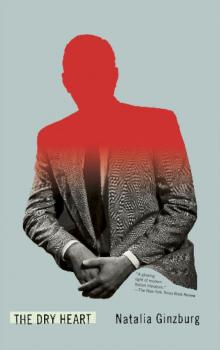 The Dry Heart
The Dry Heart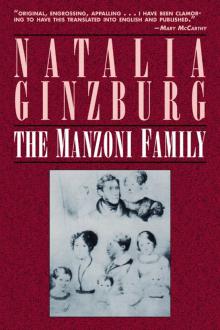 The Manzoni Family
The Manzoni Family A Place to Live
A Place to Live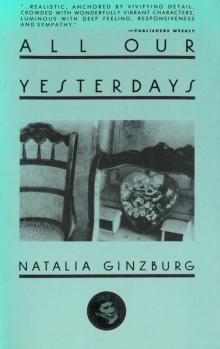 All Our Yesterdays
All Our Yesterdays The Little Virtues
The Little Virtues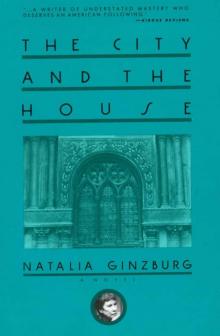 The City and the House
The City and the House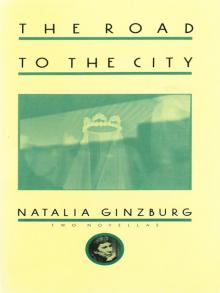 The Road To The City
The Road To The City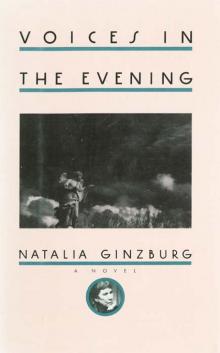 Voices In The Evening
Voices In The Evening